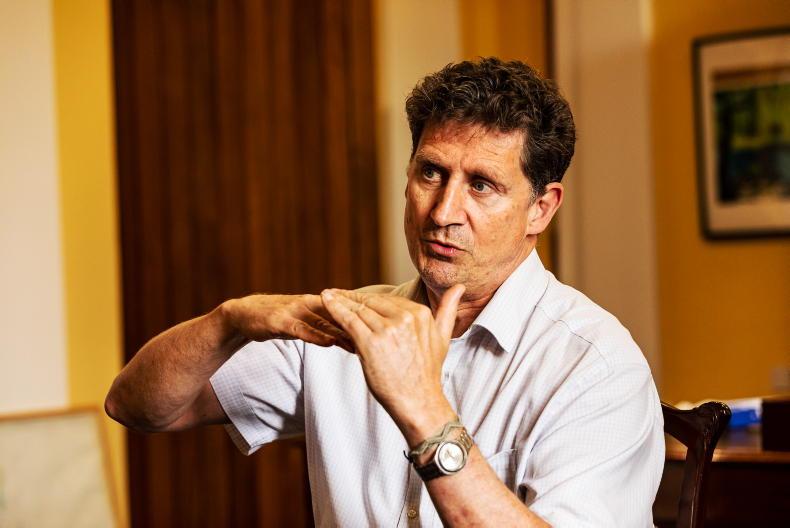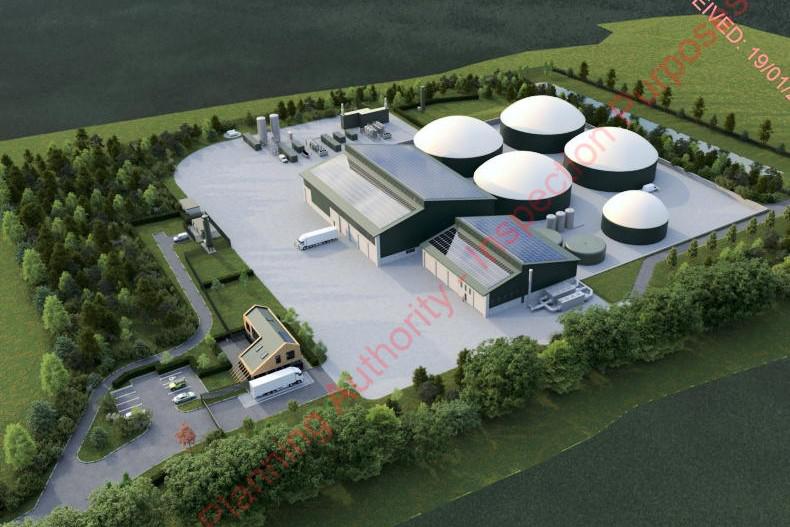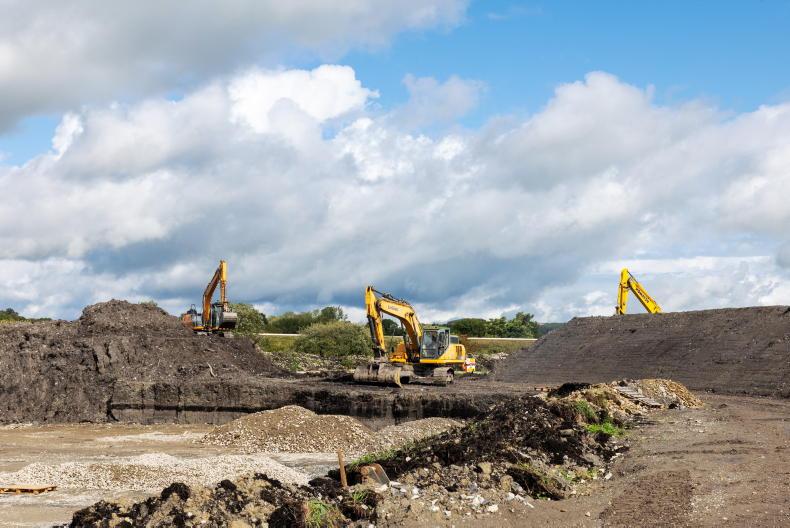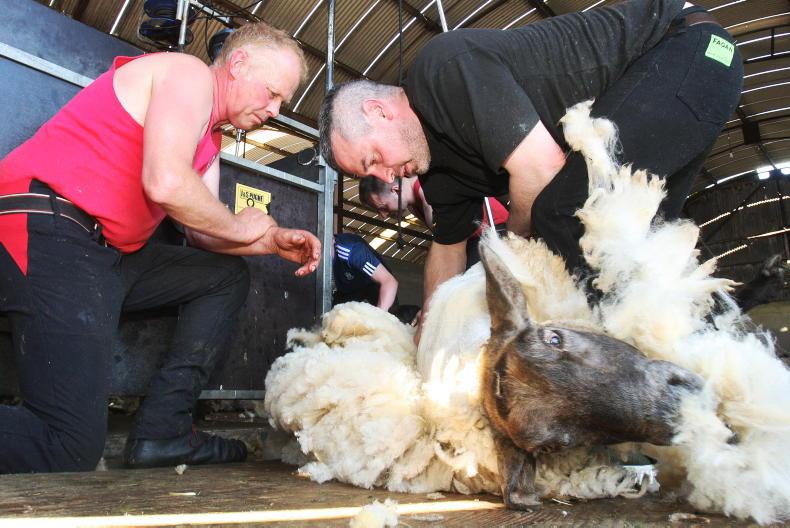The national herd will have to reduce in order for the agricultural sector to meet its emissions reduction targets, Minister for the Environment Eamon Ryan has suggested.
He said that such changes in farming systems are “the sort of choice that I think we need to make” and he said that improving farm incomes is “what matters to the Irish family farmers”.
On how farmers who reduce cattle numbers could diversify and improve incomes, Minister Ryan described the potential of the rollout of anaerobic digestion.
“One of the ways we can create new income for farmers is by using anaerobic digestion so that some of the grass we are currently giving to cattle will go instead to creating our own gas so we don’t have to import gas.
“We will have to switch and change Irish agriculture. It will introduce a whole range of new streams of income diversification. It will see a lower number in the herd but the critical thing is it has a higher income to the farmers and that’s what matters to the Irish farmers,” he said.
The minister was speaking on the Virgin Media’s Tonight Show.
‘Towards the higher end’
Minster Ryan confirmed that within the ongoing negotiations between himself and Minister for Agriculture Charlie McConalogue to secure a specific emissions reduction target for the sector, he is seeking a target of 30%. The 30% would be the maximum target within the 22-30% target currently prescribed by the Climate Action Plan.
The Green Party leader said: “It will be ambitious because every sector is going to be required to be. The level of change in agriculture, even at the lower end, is beyond compare even though I believe we will have to go towards the higher end.
“We will have to go further in agriculture and we will have to do that in a way that works, particularly in a way for a new generation of young farmers so that we retain family farms [and] so that we give a good income to family farm people on the back of protecting nature and restoring nature.”
Review of land use
The minister also outlined an ongoing project to review of how land is used in Ireland. He said this land use review is halfway complete and that it will inform Government and the agricultural sector where to plant forests, how to store carbon in peaty soils and what type of farming is required. He also said it would show how to reward such farming types that help Ireland meet its climate targets.
“I think agriculture and transport, those two areas are going to be the most difficult. There is a real challenge in agriculture but I believe we can deliver it in a way that, as I said, provides a higher income to Irish farmers which is the key way of us making this change.”
Minister Ryan said forestry must be developed “in a way that fits in with farming, not that we’re covering every farm in trees, particularly not with the plantations such as single species conifers but stitching in native forest within our farming system and giving an income to farmers for that”.
‘Come clean’
In response to Minister Ryan’s comments, Macra has called on Government to “come clean” on plans to cut the national herd.
Macra president John Keane said Minister Ryan’s comments “suggest that farmers would be expected to reduce cow numbers to grow grass and other crops to supply anaerobic digestion plants”.
“Macra na Feirme has consistently outlined measures that can be taken at farm level to reduce emissions from Irish farms. Macra has also questioned the accuracy of the science supporting emission factors contained in the inventory used to calculate Ireland’s agricultural emissions,” he said.
Keane said Macra’s current understanding is that “under the current carbon accounting model forestry is accounted for under the Land Use, Land-use Change and Forestry (LULUCF) sector while anaerobic digestion is accounted for under the energy sector”.
He said neither of these will therefore “be reflected in the agricultural sectors budget”.
“This can only mean one thing - that the grand plan within the Government is to reduce emissions from the agricultural sector by switching agricultural land to produce crops for anaerobic digestion or forestry and thus reducing available land for livestock production.”
No economic assessment
The Macra president warned that “no full-scale economic assessment has been conducted to ascertain the economic return for farmers that pertains from anaerobic digestion or long-term forestry given the challenges the sector faces currently”.
“Young people are looking for certainty and this latest development casts doubt for the future. Macra needs to see real strategies to develop a sustainable future for young people in farming,” added Keane.
Read more
Proposals to ‘sacrifice’ sucklers for climate ‘disturbing’ - INHFA
Agriculture’s emissions target unlikely to be agreed on this week
The national herd will have to reduce in order for the agricultural sector to meet its emissions reduction targets, Minister for the Environment Eamon Ryan has suggested.
He said that such changes in farming systems are “the sort of choice that I think we need to make” and he said that improving farm incomes is “what matters to the Irish family farmers”.
On how farmers who reduce cattle numbers could diversify and improve incomes, Minister Ryan described the potential of the rollout of anaerobic digestion.
“One of the ways we can create new income for farmers is by using anaerobic digestion so that some of the grass we are currently giving to cattle will go instead to creating our own gas so we don’t have to import gas.
“We will have to switch and change Irish agriculture. It will introduce a whole range of new streams of income diversification. It will see a lower number in the herd but the critical thing is it has a higher income to the farmers and that’s what matters to the Irish farmers,” he said.
The minister was speaking on the Virgin Media’s Tonight Show.
‘Towards the higher end’
Minster Ryan confirmed that within the ongoing negotiations between himself and Minister for Agriculture Charlie McConalogue to secure a specific emissions reduction target for the sector, he is seeking a target of 30%. The 30% would be the maximum target within the 22-30% target currently prescribed by the Climate Action Plan.
The Green Party leader said: “It will be ambitious because every sector is going to be required to be. The level of change in agriculture, even at the lower end, is beyond compare even though I believe we will have to go towards the higher end.
“We will have to go further in agriculture and we will have to do that in a way that works, particularly in a way for a new generation of young farmers so that we retain family farms [and] so that we give a good income to family farm people on the back of protecting nature and restoring nature.”
Review of land use
The minister also outlined an ongoing project to review of how land is used in Ireland. He said this land use review is halfway complete and that it will inform Government and the agricultural sector where to plant forests, how to store carbon in peaty soils and what type of farming is required. He also said it would show how to reward such farming types that help Ireland meet its climate targets.
“I think agriculture and transport, those two areas are going to be the most difficult. There is a real challenge in agriculture but I believe we can deliver it in a way that, as I said, provides a higher income to Irish farmers which is the key way of us making this change.”
Minister Ryan said forestry must be developed “in a way that fits in with farming, not that we’re covering every farm in trees, particularly not with the plantations such as single species conifers but stitching in native forest within our farming system and giving an income to farmers for that”.
‘Come clean’
In response to Minister Ryan’s comments, Macra has called on Government to “come clean” on plans to cut the national herd.
Macra president John Keane said Minister Ryan’s comments “suggest that farmers would be expected to reduce cow numbers to grow grass and other crops to supply anaerobic digestion plants”.
“Macra na Feirme has consistently outlined measures that can be taken at farm level to reduce emissions from Irish farms. Macra has also questioned the accuracy of the science supporting emission factors contained in the inventory used to calculate Ireland’s agricultural emissions,” he said.
Keane said Macra’s current understanding is that “under the current carbon accounting model forestry is accounted for under the Land Use, Land-use Change and Forestry (LULUCF) sector while anaerobic digestion is accounted for under the energy sector”.
He said neither of these will therefore “be reflected in the agricultural sectors budget”.
“This can only mean one thing - that the grand plan within the Government is to reduce emissions from the agricultural sector by switching agricultural land to produce crops for anaerobic digestion or forestry and thus reducing available land for livestock production.”
No economic assessment
The Macra president warned that “no full-scale economic assessment has been conducted to ascertain the economic return for farmers that pertains from anaerobic digestion or long-term forestry given the challenges the sector faces currently”.
“Young people are looking for certainty and this latest development casts doubt for the future. Macra needs to see real strategies to develop a sustainable future for young people in farming,” added Keane.
Read more
Proposals to ‘sacrifice’ sucklers for climate ‘disturbing’ - INHFA
Agriculture’s emissions target unlikely to be agreed on this week










SHARING OPTIONS